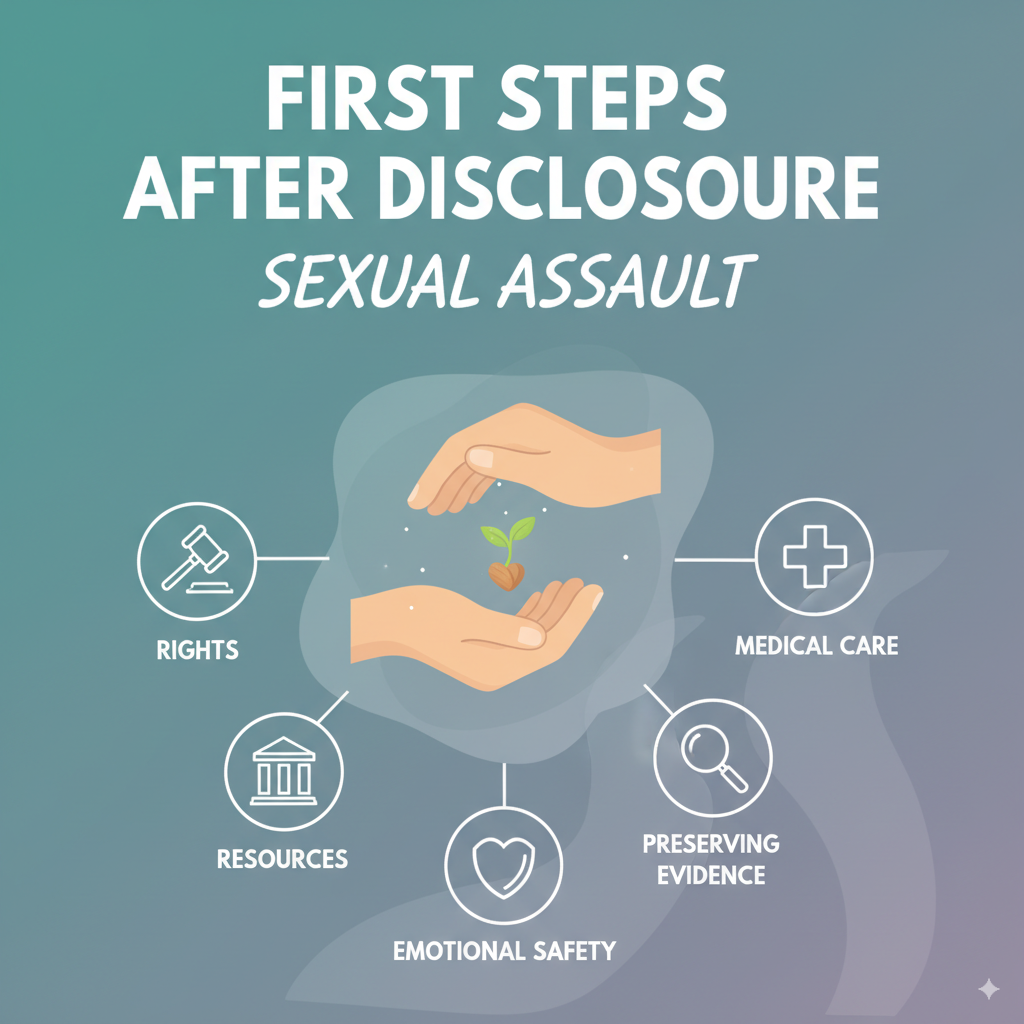First Steps After Disclosure: How to Respond to a Survivor of Sexual Assault
Learn how to support a survivor of sexual assault. This guide covers the critical first steps, including prioritizing emotional safety, seeking medical care, understanding legal rights, and connecting with vital resources.

Hearing a friend, family member, or loved one disclose that they have experienced sexual assault can be a shocking and difficult moment. It can be hard to know what to say or do. The most crucial thing to remember is that this is not about you—it is about the survivor. Your role is to provide a foundation of support, respect, and safety.
This guide outlines key first steps to take, focusing on what the survivor might need, and how you can support them without taking control of their journey.
1. Prioritize Emotional Safety: Just Listen and Believe
The first and most important response is to believe them. A simple, validating statement can be incredibly powerful. Avoid questions that could imply doubt, such as "Are you sure?" or "Why didn't you...?"
Acknowledge Their Trust: Start with a statement that recognizes the courage it took for them to tell you. "Thank you for trusting me with this," or "I'm so glad you told me."
Listen Without Judgment: Let them lead the conversation. They may not want to talk in detail, or they might want to share everything. Follow their lead. Avoid interrupting or sharing your own experiences unless they ask.
Validate Their Feelings: Use phrases like, "What you're feeling is completely normal," or "I am so sorry this happened to you." Do not try to minimize their experience or tell them how they should feel.
2. Offer Practical Support, Not Pressure
After a disclosure, a survivor may feel overwhelmed and disoriented. They need to regain a sense of control. You can help by offering concrete, non-pressuring options.
Assess Immediate Safety: If there is any concern for their immediate physical safety, the priority is to get to a secure location. Ask, "Are you in a safe place right now?" and "Is there anything I can do to help you feel safer?"
Provide a Sanctuary: A quiet, private space where they feel secure can be invaluable. Offer them a blanket, a glass of water, or anything that brings them comfort.
3. Medical Care and Preserving Physical Evidence
It is a survivor's choice whether to seek medical attention, but it's vital that they know it is an option, especially if the assault was recent. This is not about reporting; it's about their health and potential future legal options.
Seeking Medical Attention: Encourage them to consider a medical check-up to address any physical injuries, check for sexually transmitted infections (STIs), or discuss pregnancy prevention.
The SANE Exam ("Rape Kit"): A Sexual Assault Nurse Examiner (SANE) can perform a forensic medical exam. This exam collects potential evidence while also providing medical care. It's crucial to know that this can be done without filing a police report. The evidence can be preserved for a set period (often 30 days or more), giving the survivor time to decide if they want to report.
Preserving Evidence: If they are considering a SANE exam, advise them gently, if they haven't already, not to shower, change clothes, or clean up in any way. However, stress that their comfort and emotional state are far more important than any physical evidence.
4. Understanding Legal Rights and Reporting
Deciding whether to report a sexual assault is a deeply personal and often complicated decision. Never pressure a survivor to report.
Provide Information, Not an Ultimatum: You can say, "There are resources available if you decide you want to talk to someone about your legal options, but that decision is entirely up to you."
Different Paths to Justice: Explain that there are different ways to seek justice or healing. Some survivors choose to report to the police, some prefer to seek support through non-profit organizations, and others find their own path to healing without official legal involvement. All of these paths are valid.
5. Connecting with Professional Resources
You are not expected to be a legal professional, a medical expert, or a therapist. The best way you can help is by connecting the survivor with people who are.
Sexual Assault Hotlines: Provide the number for national hotlines like RAINN (Rape, Abuse & Incest National Network) at 1-800-656-HOPE. These hotlines are confidential, free, and staffed by trained professionals who can offer immediate support and local resource referrals.
Local Support Centers: Research and share information about local sexual assault centers or advocacy groups. They can provide counseling, support groups, and a safe place to process what happened.
Mental Health Professionals: Suggest talking to a therapist or counselor who specializes in trauma. This can be a vital part of the healing process.
Remember, the journey to healing is unique for every survivor. Your role is not to fix the problem but to be a constant source of support, respect, and unconditional belief. By taking these initial steps, you can help them reclaim their sense of safety and power.
